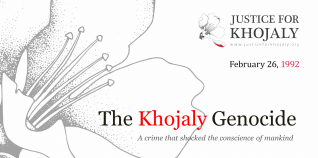OSCE PA adopts Baku Declaration
 Baku Declaration has been adopted today as part of the 23rd Annual Session of the OSCE Parliamentary Assembly (PA).
Baku Declaration has been adopted today as part of the 23rd Annual Session of the OSCE Parliamentary Assembly (PA).
The OSCE PA 23rd Annual Session kicked off in Azerbaijani capital of Baku on June 28 and ended on July 2.
The declaration states that taking measures for settling protracted conflicts in the OSCE region and for a progress in their settlement by peaceful means and negotiations, as well as, achievement of this in line with the UN Charter, Helsinki Final Act and the international law norms is one of the main goals of the OSCE.
The declaration emphasizes the importance of non-infringement of the OSCE member states' borders and respect for the principles of territorial integrity, as reflected in the Helsinki Final Act.
Aside from that, the document reflects a call to take new measures to stop the illegal arms trade, which has widely spread in the conflict zones, causing the death of large numbers of people, including civilians.
The importance of fighting against such threats as the cyber-war, prevention of similar threats, and working in this area in accordance with the EU Cyber Security Strategy have also been highlighted in the Baku Declaration.
The document also reflected a need to strengthen measures to combat trafficking in human beings, including trafficking in children for sexual exploitation. The importance of taking necessary measures to provide full assistance to the victims of these crimes was also underscored in the declaration.
The document also stressed the importance of fighting against terrorism and radicalism.
A concern was expressed in the document regarding the growth of threat of terrorism and radicalism as a result of terrorists' return from conflict zones to the countries where they reside, and the OSCE members are encouraged to review the possibilities of taking additional measures to enhance the organization's role in preventing these threats.
Another concern was expressed in the declaration over the growing use of information and communication technologies, as well as the internet and social networking websites for terrorist purposes, for terrorism calls, its financing and attracting terrorists.
The document also included a call addressed to the OSCE member countries to take all measures to prevent the use of information and communication technologies, the internet and social networking websites for terrorist purposes, and urges them to secure the compliance of these measures with the national legislation, international law norms and political commitments undertaken within the OSCE.
The declaration urges the OSCE member states to align national legislation on fighting terrorism with international commitments in this area, the UN resolutions, anti-terrorism conventions and the UN Convention against Transnational Organized Crime.
The document also focuses on the Ukrainian crisis supporting the country's territorial integrity and sovereignty, and calls on the OSCE member countries to support the territorial integrity of Ukraine at international level.
Attention is also paid in the declaration to such issues as continuation of OSCE's cooperation with Afghanistan, preservation and promotion socio-economic rights in the OSCE region, food security in the OSCE region, immigration issues, as well as issues related to the situation of refugees and internally displaced persons, preservation of cultural property, the fight against torture and others.




















